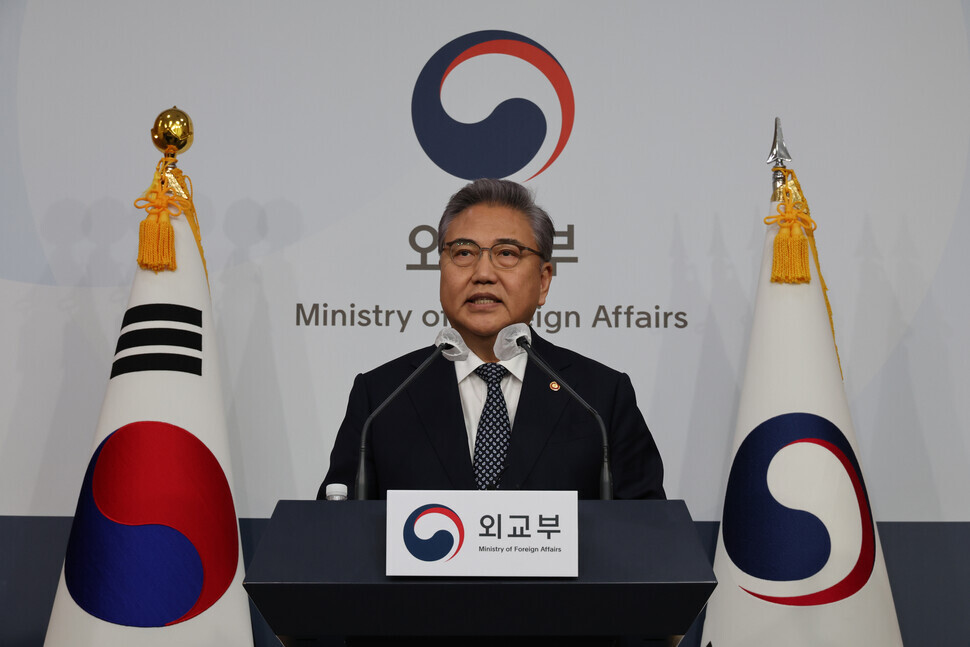hankyoreh
Links to other country sites 다른 나라 사이트 링크
Yoon administration presents plan for forced labor that lets Japanese firms off the hook

On Monday, the Yoon Suk-yeol administration officially unveiled its proposal to have a third party compensate victims of Japanese colonial era forced mobilization. According to the plan, the funds will be raised by voluntary contributions from the domestic private sector, including Korean firms. The announcement, however, neglected to indicate participation by Japanese firms.
Needing to come up with a “solution” after a 2018 Supreme Court ruling that found Japanese corporations that used forced labor liable for compensation to their victims, the government cited points such as future-oriented Korea-Japan relations, bilateral cooperation amid the serious situation on the Korean Peninsula, the region, and the world, and the advanced age of the victims as reasons for going with this plan.
However, since the government’s solution leaves out compensation by the Japanese companies that stood in the defendant stand in the lawsuit, such as Mitsubishi Heavy Industries, as well as a direct apology from the Japanese government, it is expected to occasion strong opposition from organizations representing victims and from the domestic public.
"The government has made efforts to come up with a reasonable solution that meets the joint interests of South Korea and Japan while also respecting the opinions of the victims of forced labor," Foreign Minister Park Jin said in a statement at 11:30 am that day.
“The Foundation for Victims of Forced Mobilization by Imperial Japan plans to provide financial compensation for court ruling fees and for delayed payments to the plaintiffs of the three final rulings of the Supreme Court in 2018 as part of supporting the bereaved families of the victims of forced labor and providing reparations,” Park added.
The Foundation for Victims of Forced Mobilization by Imperial Japan falls under the Ministry of the Interior and Safety and was established after the enactment of the Special Act on Verification and Support for the Victims of Forced Mobilization under Japanese Colonialism in Korea.
“In addition, the foundation also plans to pay the plaintiffs the court ruling fees and delayed interest if other lawsuits related to forced labor currently pending are ruled in favor of the plaintiffs,” Park said.
Park then explained that the financial resources to pay for such compensation would be collected through “voluntary contributions from the private sector,” while adding that available funds to carry out the foundation’s purpose will be further increased in the future.
Until now, Japan has insisted not only that there was no forced labor, but that the compensation issue was settled through a bilateral claims settlement agreement in 1965, and that South Korea should be the one to come up with a solution to the issue. What the South Korean government ended up doing on Monday was, in fact, present a “solution” that practically accepts all of these claims.
Still, the Yoon administration is lauding the plan as “a great decision commensurate with our national power” and “a solution led by us.”
Park also said that the government hopes to stand by the joint declaration by Kim Dae-jung of Korea and Keizo Obuchi of Japan in 1998 in an “expansive” way, overcome the unfortunate history of the past, and work together [with Japan] to develop a future-oriented relationship based on reconciliation and friendly cooperation.”
"We hope that the government will work with Japan, its closest neighbor that shares the universal values of liberal democracy, market economy, the rule of law, and human rights amidst the recent grave situation on the Korean Peninsula, regionally, and the world," Park added.
By Kwon Hyuk-chul, staff reporter
Please direct questions or comments to [english@hani.co.kr]

Editorial・opinion
![[Column] Season 2 of special prosecutor probe may be coming to Korea soon [Column] Season 2 of special prosecutor probe may be coming to Korea soon](https://flexible.img.hani.co.kr/flexible/normal/500/300/imgdb/original/2024/0426/3317141030699447.jpg) [Column] Season 2 of special prosecutor probe may be coming to Korea soon
[Column] Season 2 of special prosecutor probe may be coming to Korea soon![[Column] Park Geun-hye déjà vu in Yoon Suk-yeol [Column] Park Geun-hye déjà vu in Yoon Suk-yeol](https://flexible.img.hani.co.kr/flexible/normal/500/300/imgdb/original/2024/0424/651713945113788.jpg) [Column] Park Geun-hye déjà vu in Yoon Suk-yeol
[Column] Park Geun-hye déjà vu in Yoon Suk-yeol- [Editorial] New weight of N. Korea’s nuclear threats makes dialogue all the more urgent
- [Guest essay] The real reason Korea’s new right wants to dub Rhee a founding father
- [Column] ‘Choson’: Is it time we start referring to N. Korea in its own terms?
- [Editorial] Japan’s rewriting of history with Korea has gone too far
- [Column] The president’s questionable capacity for dialogue
- [Column] Are chaebol firms just pizza pies for families to divvy up as they please?
- [Column] Has Korea, too, crossed the Rubicon on China?
- [Correspondent’s column] In Japan’s alliance with US, echoes of its past alliances with UK
Most viewed articles
- 11 in 5 unwed Korean women want child-free life, study shows
- 2AI is catching up with humans at a ‘shocking’ rate
- 3[Column] Has Korea, too, crossed the Rubicon on China?
- 4[Column] Season 2 of special prosecutor probe may be coming to Korea soon
- 5Division commander ordered troops to enter raging flood waters before Marine died, survivor says
- 6[Photo] More Sewol paintings by Hong Sung-dam
- 7Court dismisses comfort women’s suit against government for signing 2015 agreement with Japan
- 8[Editorial] Seoul’s callous response to disability rights protests
- 9Netflix imperialism: Are Korea’s days as the platform’s favorite content creator numbered?
- 10Marriages nosedived 40% over last 10 years in Korea, a factor in low birth rate